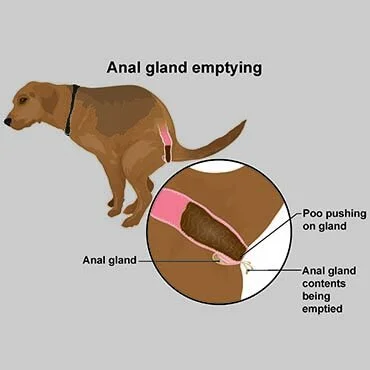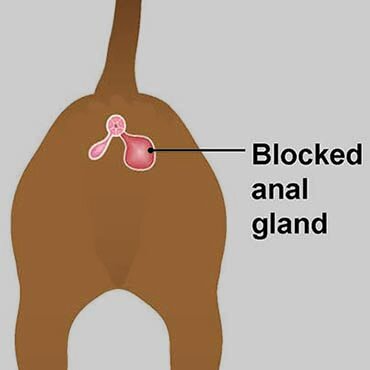Scooting bum
Did that grab your attention? Does your dog scoot their bum? This is one sign that your dog may be suffering with blocked anal glands.
The anal glads are a pair of sacs inside the anus, if you can imagine a clock face the glands are situated 4 O’clock and 8 O’ clock. They contain a strong smelly liquid used for marking territory. Healthy glands empty when a dog passes poo.
Blocked glands are quite a common problem reasons why they may be blocking:
Overweight dogs are more susceptible
The glands are just situated a little oddly making it harder for them to empty.
The ducts are narrow
If your dog has had a bout of diarrhoea then the glands can fill up as they rely on firm bulky stools to push past and empty them.
A very pleasant image of a pup passing stools
Symptoms
Symptoms of a blocked anal gland include:
Rubbing the bottom (anus) on the ground
A foul, fishy smell
Nibbling and licking the anus and/or lower back
Licking front paws
Suddenly sitting down in discomfort
Looking round at their back end suddenly.
Irritated
Blocked anal gland - Photo from Pdsa
Treatment for blocked anal glands
Blocked anal glands are often simple to cure:
Emptying. Your vet or vet nurse will feel inside your dog’s bottom and try to empty their glands. Never attempt to do this yourself unless you have had instruction from your vet, and you are confident doing so - anal glands can burst if they are squeezed too hard or in the wrong way.
(If I think they are infected I don’t try to empty them as its painful I let them have a few days of medication then try again its much kinder!)
Medication. Medication such as anti inflammatories and/or antibiotics are only usually necessary if your dog’s glands can’t be unblocked, are very painful, or have caused an infection/abscess.
Surgery. If your dog has ongoing anal gland problems that can’t be cured with emptying or medication, your vet may recommend flushing them under anaesthetic, we also sometimes pack the gland with a steroid cream.
Outlook
If your vet/nurse manages to empty your dog’s anal glands, this is likely to provide instant relief and solve the problem.
Prevention
There are a few simple precautions you can take to reduce your dog’s chance of anal glad problems:
Keep your dog a healthy weight - Overweight dogs generally have weaker muscles around their bottom which makes gland emptying more difficult.
Regular checks - If your dog frequently suffers with blocked anal glands, they may require regular vet/veterinary nurse visits to have them checked. You will quickly become an expert at spotting the signs of an anal gland problem developing. (I usually advise to mark on your calendar to track it)
Fibre - Adding extra fibre to your dog’s diet can help to firm-up and bulk-out their poo. As a result, when your dog goes to the toilet their stool will press on the anal glands and help to empty them. Sugar free bran flakes or bran powder is often the best way to add fibre to your dog’s diet. (I know this is tricky to get right, I recommend a supplement called Yudigest)
You shouldn't need your pets anal glands emptying routinely only if problems occur.
Some groomers may empty your pets anal gland but they do it a different way to how we do it.
Its worth mentioning that you should be routinely worming your pet as scooting bums could also be a sign of worms - adult dogs need worming every 3 months.
I hope this blog post has been helpful and hasn’t just grossed you out :-D
Thank you
Cheryl xx

